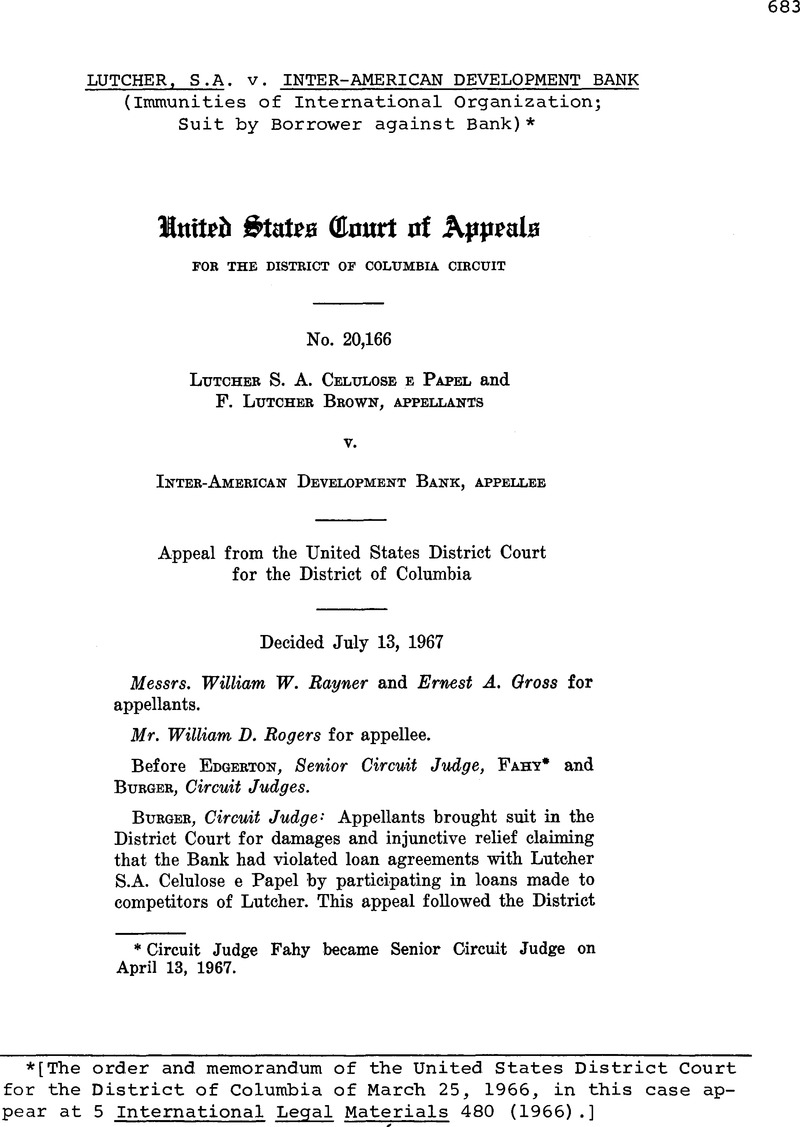No CrossRef data available.
Article contents
Lutcher, S.A. V. Inter-American Development Bank (Immunities of International Organization; Suit by Borrower Against Bank)*
Published online by Cambridge University Press: 18 May 2017
Abstract

- Type
- Judicial and Similar Proceedings
- Information
- Copyright
- Copyright © American Society of International Law 1967
Footnotes
[The order and memorandum of the United States District Court for the District of Columbia of March 25, 1966, in this case appear at 5 International Legal Materials 480 (1966).]
References
* Circuit Judge Fahy became Senior Circuit Judge on April 13, 1967.
1 Appellants also appeal from the District Court’s statement that the competitor was an indispensable party; our disposition of the case renders this question moot. Cf. Lumberman’s Casualty Co. v. Elbert, 348 U.S. 48, 51-52 (1954).
2 Articles of Agreement Establishing the Inter-American Development Bank, April 8, 1959, Art. I, § 1, 2(a) (ii), 10 U.S.T. & O.I.A. 3029, T.I.A.S. No. 4397.
3 Immunity can arise from the common law doctrine of sovereign immunity in some circumstances and from specific legislation. Congressional belief, well founded or not, that United States law did not provide immunity for international organizations was a motivating factor behind the International Organizations Immunities Act, infra. H.R.Rep. No. 1203, 79th Cong., 1st Sess. 2 (1945); S.REP. NO. 861, 79th Cong., 1st Sess. 2 (1945).
4 International Organizations Immunities Act § 2(b), 59 Stat. 669 (1945), 22 U.S.C. § 288a (1964). The United States participates in the Inter-American Development Bank pursuant to the Inter-American Development Bank Act, 73 Stat. 301 (1959), 22 U.S.C. § 283 (1964).
5 Exec. Order No. 10873, 25 Fed. Reg. 3097 (1960).
6 See Article 50 of the Asian Bank Agreement, quoted infra.
7 Hearings on H.R. 7072 and 7073 Before Subcommittee No. 1 of the House Committee on Banking and Currency, 86th Cong., 1st Sess. 20 (June 3, 4, and 5, 1959).
8 H.R. Doc. No. 133, 86th Cong., 1st Sess. 18 (1959).
9 Exec. Order No. 11019, 27 Fed. Reg. 4145 (1962).
10 Exec. Order No. 10680, 21 Fed. Reg. 7647 (1956); Exec. Order No. 9751, 11 Fed. Reg. 7713 (1946).
11 This has in fact occurred; a Bank affidavit in the instant case states that the Bank has its main office in Washington, D.C., Regional Offices in 15 of its member countries, and a special representative in Paris, France.
12 Articles of Agreement Establishing the Asian Development Bank, December 4, 1965, Art. 50, par. 1.
13 Hearing on H.R. 12563 Before Senate Committee on Foreign Relations, 89th Cong., 2d Sess. 129 (February 16, 1966).
14 Hearings, supra note 7. at 20.
15 The Bank states that borrowers do not regard it as essential to be able to sue since “the Bank’s obligations to its borrowers are discharged, for all practical purposes, when it has disbursed the monies it promised.” But that oversimplifies the possible contractual relationships; it also overlooks that the Bank might be accused of not disbursing the promised monies.
16 The Bank has evinced a recognition that arbitration may spawn suit. The contract between it and Lutcher provides, “No recourse shall be available that does not comply with the award.” The recourse referred to is most likely judicial.
It is interesting to note the World Bank’s view of the relationship between arbitration and immunity since the immunity provision in the World Bank agreement is identical to the Inter-American Development Bank’s. Articles of Agreement Establishing the International Bank for Reconstruction and Development (World Bank), Art. VII, Section 3, 60 Stat. 1440, 1457 (1945), T.I.A.S. No. 1502. The loan Regulations of the World Bank specifically provide for judicial enforcement of arbitration (where a government is not involved). Loan Regulations No. 4, February 15, 1961, Art. VII, § 7.04 ( k ) ; Delaume, Jurisdiction of Courts and International Loans, 6 AM.J.COMP.L. 189, 210 (1957).




